Don’t Turn Your Downspouts into the Street.
Do Install a Rain Barrel to Capture and Reuse Runoff.
A rain barrel is a system that collects and stores rainwater from your roof that would otherwise be lost to runoff and diverted to storm drains and streams. Usually, a rain barrel is composed of a 55-gallon drum, a vinyl hose, PVC couplings, a screen grate to keep debris and insects out, and other off-the-shelf items. A rain barrel is relatively simple and inexpensive to construct and can sit conveniently under any residential gutter downspout.
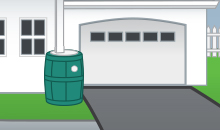 Rain Barrel Distribution
Rain Barrel Distribution
Since 2010, 920+ free, pre-drilled barrels (to be made into rain barrels) have been distributed to residents at demonstrations and the annual GreenFest. Residents can purchase rain barrel parts at a reduced price at a local hardware store, in partnership with the County. A rain barrel is the perfect way to water your lawn and garden while saving water.
Other Links:
- Learn more about rain barrels
- Learn how to earn Watershed Protection Fee Credit for installing several rain barrels.
Don’t Overuse Turf.
Do Install a Rain Garden to Help Slow Down Runoff.
Rain gardens are shallow, planted depressions that collect and absorb runoff from rooftops, sidewalks, and streets. Rain gardens are versatile features that can be installed in almost any unpaved space and typically feature low-maintenance native plants. Rain gardens can cut down on the amount of pollution reaching creeks and streams by up to 30%.
 Rain Garden Workshops
Rain Garden Workshops
The County conducted rain garden workshops for residents, who installed 30 residential rain gardens in the Red Hill Branch subwatershed. The Howard County Office of Community Sustainability partnered with University of Maryland Extension and continues to host residential rain garden and stormwater landscaping workshops.
Other Links:
- Learn more about rain gardens
- Learn how to earn Watershed Protection Fee Credit for installing a rain garden.
Don’t Overuse Asphalt for Yard Paths.
Do Install Permeable Pavers.
 Instead of a typical concrete or asphalt walkway or driveway, property owners should consider installing permeable pavers to help minimize stormwater runoff. These interlocking pavers, typically made of concrete, create voids on the corners of the pavers that allow runoff to soak into the ground. Grass is typically encouraged to grow in between permeable pavers, to further improve permeability using their root channels.
Instead of a typical concrete or asphalt walkway or driveway, property owners should consider installing permeable pavers to help minimize stormwater runoff. These interlocking pavers, typically made of concrete, create voids on the corners of the pavers that allow runoff to soak into the ground. Grass is typically encouraged to grow in between permeable pavers, to further improve permeability using their root channels.
Other Links:
- Learn more about permeable pavers
- Learn how to earn Watershed Protection Fee Credit for installing permeable pavers.
Don’t Wash Your Car in the Driveway.
Do Take Your Car to a Professional Service Location.
Whenever you wash your vehicle in the driveway or street, untreated, detergent-rich water flows down the street and into the storm drain. This water may contain high amounts of chemicals, nutrients, metals, and hydrocarbons.
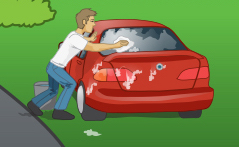 Instead, you should consider:
Instead, you should consider:
- Washing your vehicle on grass or permeable pavement. This allows for dirty water to be soaked into and filtered by the ground.
- Bringing your vehicle to commercial car wash facilities. These facilities often recycle their water and/or are required to treat their wash water discharge prior to releasing it to the sanitary sewer system.
Most stormwater impacts from car washing are from residents, businesses, and charity car wash fundraisers that discharge polluted wash water to the storm drain system.
Other Links:
- Workin' At The Car Wash, Blog Article
- What is Water Pollution?
- Local impacts of runoff
Don’t Let Vehicle Maintenance Chemicals Spill in Your Driveway.
Do Properly Maintain Your Vehicle and Clean Up Spills.
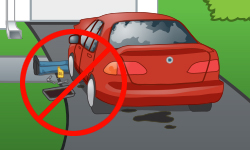 Many people perform maintenance on their vehicles in their driveways or on the street. While this activity isn’t always a problem, it’s important to remember that any spills of oil or other chemicals that occur will get washed into the storm drain the next time it rains. To help prevent dangerous chemicals and materials from entering into the environment, you should always remember to prevent and clean up any chemical spills. You could also take your vehicle to a professional facility for service or proper disposal of old oil.
Many people perform maintenance on their vehicles in their driveways or on the street. While this activity isn’t always a problem, it’s important to remember that any spills of oil or other chemicals that occur will get washed into the storm drain the next time it rains. To help prevent dangerous chemicals and materials from entering into the environment, you should always remember to prevent and clean up any chemical spills. You could also take your vehicle to a professional facility for service or proper disposal of old oil.
Other Links:
- Local impacts of water runoff in Howard County
Don’t Ignore Pet Waste.
Do Properly Dispose of Your Pet’s Waste in Your Yard and Community.
Did you know that over 6,200 lbs of dog poop is generated every day in Howard County? Dog waste left on streets, pavement, yards, driveways, or along roads does not magically disappear or fertilize the ground. Animal waste that’s improperly disposed of can be picked up by stormwater runoff and carried into storm drains or nearby streams, causing significant stormwater pollution and potential health risks to adults, children, and pets.
As pet owners, we all have a responsibility to properly dispose of our pet’s waste. Take a plastic bag or paper cup along when walking your pet. Dispose of the waste properly in the provided public or household trash receptacles, or by flushing it down the toilet. Pick up the waste every time, everywhere, even in the snow.
Dangers of Improperly Handled Pet Waste
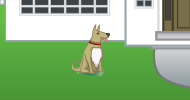
Not only are animal feces a nuisance in our environment and on the bottom of our shoes, but it also presents serious health risks. Pet waste carries bacteria, viruses, and parasites that can make people, especially children, sick. Pets can catch diseases from contact with infected feces of other pets. Pets and children who play in yards or parks where pets defecate are most at risk for infections from disease-causing bacteria and parasites found in pet waste. It is much easier to pick up pet waste than to care for and worry about a sick child or pet—so get scoopin’.
Other Links:
- Learn the Facts
- Local impacts of water runoff in Howard County
Don’t Overuse Yard Maintenance Chemicals.
Do Practice Proper Yard Care.
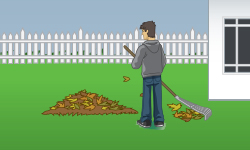 Use lawn or garden chemicals sparingly
Use lawn or garden chemicals sparingly
When fertilizing or chemically treating your yard and garden:
- Get a soil test first to know what your lawn actually needs.
- Consider choosing natural alternatives when possible.
- Don’t overuse chemicals—read the labels carefully and measure your yard. Check the weather forecast to avoid applying them before a storm.
Mow Your Lawn Less Often
Try to keep your lawn at least 3" in height to minimize weed growth, reduce the need for watering, and decrease the likelihood of pests.
Other Links:
- Learn about convervation landscaping
Don’t Litter.
Do Remember: “Only Rain Down the Drain!”
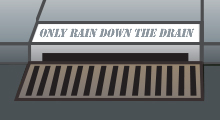 Don't dump anything down storm drains. Litter is a primary cause of stormwater runoff pollution, but it’s also one of the easiest to prevent.
Don't dump anything down storm drains. Litter is a primary cause of stormwater runoff pollution, but it’s also one of the easiest to prevent.
- Properly dispose of trash and recycling.
- Clean up yard clippings and leaves to avoid them being washed into the storm drain when it rains.
- Sweep your sidewalks and driveway, and compost or dispose of the debris rather than hosing it down and washing it to the storm drain.
- Fight runoff with awareness—tell your neighbors "only rain down the drain," and complete a storm drain stenciling project in your neighborhood.
Other Links:
- Learn how to "Storm Drain Stencil"
